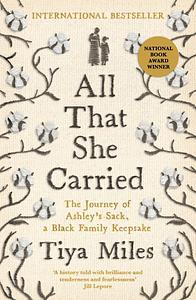Take a photo of a barcode or cover
663 reviews for:
All That She Carried: The Journey of Ashley's Sack, a Black Family Keepsake
Tiya Miles
663 reviews for:
All That She Carried: The Journey of Ashley's Sack, a Black Family Keepsake
Tiya Miles
dark
emotional
sad
slow-paced
challenging
dark
emotional
informative
reflective
sad
slow-paced
This is an impressive book, deservedly a winner of the National Book Award, but I’m not sure how to rate it. TBH, I probably wouldn’t have finished it if I hadn’t been reading it for a yearly book challenge.
The author is a multi-award winning historian and professor at Harvard, who shines a much needed light on the horrors of the race based slavery system in America. In this book she links that history to the survival of women within that system and to the material culture of the time.
The use of historical records, examination of textiles, and practice of genealogy especially made me look forward to reading this.
However, the work reads more like an academic treatise or thesis than popular history, with apropos language. This, plus the lack of documentary evidence, leads to a lot of repetition (padding?) and emphasis on minor details. Every action or object is freighted with unimaginable significance and symbolism.
Because of the use of social history, a wide range of subjects was covered in great detail, from Black folkloric religion to the horticultural development of pecan trees to feminist use of needlework to the etymology of the word “tote.” Most of which was interesting in itself, but frustrated any narrative progression to the text.
A book I’m glad to have read, I’m just not so sure I enjoyed reading it. Janina Edwards did an excellent job narrating the audiobook.
The author is a multi-award winning historian and professor at Harvard, who shines a much needed light on the horrors of the race based slavery system in America. In this book she links that history to the survival of women within that system and to the material culture of the time.
The use of historical records, examination of textiles, and practice of genealogy especially made me look forward to reading this.
However, the work reads more like an academic treatise or thesis than popular history, with apropos language. This, plus the lack of documentary evidence, leads to a lot of repetition (padding?) and emphasis on minor details. Every action or object is freighted with unimaginable significance and symbolism.
Because of the use of social history, a wide range of subjects was covered in great detail, from Black folkloric religion to the horticultural development of pecan trees to feminist use of needlework to the etymology of the word “tote.” Most of which was interesting in itself, but frustrated any narrative progression to the text.
A book I’m glad to have read, I’m just not so sure I enjoyed reading it. Janina Edwards did an excellent job narrating the audiobook.
I'm not sure I'll ever stop thinking about this family. Miles does an incredible job researching a family that left an incredible, but largely undocumented, legacy of loss and unwaivering love. I could only read small bits of the book without lengthy breaks, as I was profoundly moved.
informative
slow-paced
informative
medium-paced
informative
reflective
sad
slow-paced
challenging
informative
reflective
slow-paced
Quite interesting in that most of the books on slavery and blacks during the 1800's focus on the male (exception to The Water Dancer), this was enlightening in that this book looks at the female during this era. Embroidery and objects related to remembering family history. Mementos to remember the heritage of the black experience - cooking, etc.
I was reading more about the enslavers than Rose & Ashley. Yes I understand you have to set up the story, but that many words should be for Rose & Ashley, NOT sex traffickers.



